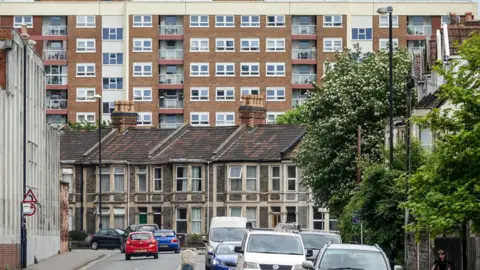Boris Johnson sets out plan for benefit claimants to get mortgages
Prime Minister Boris Johnson has unveiled plans to allow benefits to be put towards mortgages in England, as he sought to relaunch his premiership.
He made the "benefits-to-bricks" pledge in his first big speech since surviving a bid to oust him by Tory MPs.
Speaking in Blackpool, he also vowed to extend a scheme to allow social tenants to buy their homes.
But critics say the proposals are unworkable and would make the housing crisis worse.
In Monday's confidence vote on Mr Johnson's leadership, four in 10 Tory MPs backed getting rid of him, amid anger over widespread Covid rule-breaking in Downing Street during lockdown.
There is also disquiet among Conservatives over the government's decision to raise National Insurance, while the cost of living is soaring and the public finances have been battered by the expense of dealing with Covid.
In a wide-ranging speech aimed at demonstrating he has not run out of ideas and is focused on issues that most matter to voters, Mr Johnson promised more help "over the next few weeks" to deal with 40-year-high inflation driven by energy price rises.
"Global headwinds are strong... but our engines are stronger," said Mr Johnson, adding that "we are on your side" in cutting the cost of fuel, childcare, transport and other living expenses.
"And, while it's not going to be quick or easy, you can be confident that things will get better, that we will emerge from this a strong country with a healthy economy," the prime minister told the audience at Blackpool and The Fylde College.
He said "economic growth" was the answer and he hoped tax cuts - which have been demanded by some Tory MPs - would come "sooner rather than later".
'Dream of home ownership'
Mr Johnson restated the government's commitment to extending a home-buying scheme, known as right to buy, to housing association tenants.
He said he wanted to extend it "within existing spending plans" and ensure a "one-for-one replacement" of each home sold.
The prime minister also said universal credit recipients would get to choose whether to spend their benefits on rent or put them towards a mortgage.
The government will explore discounting Lifetime ISA and Help to Buy ISA savings from Universal Credit eligibility rules, Mr Johnson said.
Currently, claimants are only eligible for universal credit if they have savings below £16,000, and Lifetime ISAs are included in this limit.
Changing these policies would "help millions realise the dream of home ownership", Mr Johnson said.
Housing benefits, which help low-income or unemployed people pay their rent, cost the government around £30bn a year, much of which goes to private landlords. A person is not usually eligible for the payments if they have a mortgage.

This speech was in the diary before the confidence vote on Monday but it nevertheless became a chance to try and reset Boris Johnson's premiership.
This was a prime minister who wanted to talk political plans - not personal problems.
Mr Johnson wants to focus on ways to help households with costs - but there are big questions about how and when the policies announced today will be delivered.
This won't be an overnight equivalent of Thatcher's council house scheme.
The PM also failed to commit to the pledge to build 300,000 houses a year in England by 2025 - something which was in the 2019 Conservative general election manifesto.
It's looked increasingly unlikely since the government dropped plans to reform the planning system in England to make it easier for developers to win approval.
A reminder perhaps that housing pledges can often be easier in theory than in practice.

 Getty Images
Getty ImagesLabour's shadow levelling up secretary Lisa Nandy questioned whether people on benefits could afford mortgage deposits, saying: "This speech was yet more evidence that the prime minister and his tired government are out of ideas.
"You can't solve a housing crisis with back-of-the-envelope policies that have no realistic chance of success."
Liberal Democrat leader Sir Ed Davey said: "Boris Johnson has lost the confidence of his party, Parliament and the country. The desperate attempt to relaunch his leadership today will do nothing to win it back."

It's not entirely clear how the government's right-to-buy policy is going to work:
- There is already a shortage of social housing without selling properties - 1.1 million people are on waiting lists
- The government has not revealed who will be able to take advantage of the scheme, how much it will cost and whether it will be capped
- It's the third such pilot scheme - previous ones found that some housing association properties were not eligible to be sold and there was concern about the financial risks being taken on by participants
- While the government has said that there will be funding for housing associations to replace each home sold, previous pilots have had problems with replacements coming quickly enough or being like-for-like
- The policy depends on negotiations with housing associations, which will not necessarily want to take part.

Council tenants in England have been able to buy their homes at a discount since 1980, when Conservative Prime Minister Margaret Thatcher introduced the policy.
But the same is not true for people renting from housing associations, unless their property was once owned by a local authority and they lived in it during this period.
Polly Neate, chief executive of housing charity Shelter, called Mr Johnson's housing proposals "baffling, unworkable, and a dangerous gimmick".
Extending the right to buy would "put our rapidly shrinking supply of social homes at even greater risk," she added.
